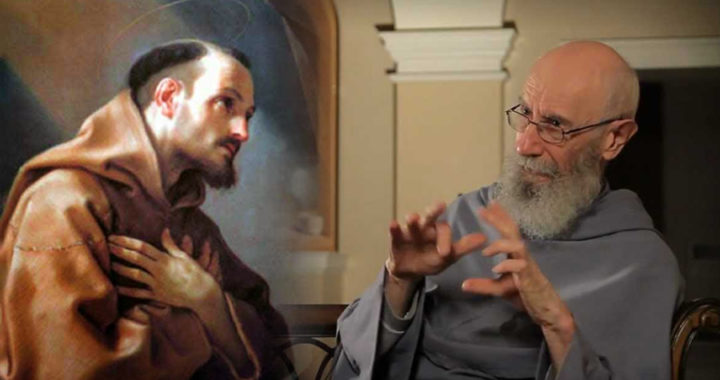|
|
|
|
|
|
|
|
|
|
|
|||
|
|
|
|
|
|
|
|
|
|
|
|||
|
|
|
|
|
|
|
|
|
|
|
|||
|
|
|
|
|
|
|
|
|
|
|
|
|
|
|
|
|
|
|||
|
|
|
|
|
|
|
|
|
|
|
|||
|
|
|
|
|
|
|
|
|
|
|
|||
|
|
|
|
|
|
|
Review
The triple way (purgative, illuminative, unitive) extends to the following:
- Reading/meditation
- Prayer/contemplation
What is contemplation?
“Through contemplation our mind passes unto the heavenly Jerusalem, after whose likeness the Church is formed...” (3.1.1 2) Contemplation is the wisdom to which meditation and prayer tend. (Fehlner, footnote 99) In glory there is a threefold gift, in which consists the perfection of the reward. Each gift corresponds with a particular rung of the celestial hierarchy (3.1.1):
-
- Supreme eternal peace—corresponding to the choir of Thrones
- Clear vision of supreme truth—corresponding to the choir of Cherubim
- Full enjoyment of the supreme good—corresponding to the choir of Seraphim
It is necessary to attain each of the following through the three ways:
- Purgative—expulsion of sin—the goal of which, is the slumber of peace
- Illuminative—imitation of Christ—the goal of which, is the splendor of truth
- Unitive—reception of the Groom—the goal of which, is the sweetness of charity
Chapter 3.6
Another way of progressing to perfect contemplation in nine steps
Three things are necessary for everyone after the fall of Adam:
- Bitter sorrow (purgation), in which you must
- Ponder the evil in which is the consequence of your own wickedness
- Remember the suffering Christ endured under torment
- Beg healing for the miseries you have inflicted on others
- Gratitude (perfection), in which you must
- Admire the blessings consequent on your being created out of nothing
- Not permit yourself to boast of your merits
- Be thankful for being snatched out of the jaws of hell
- Imitation of Christ (enlightenment), in which your
- Eye of truth must be directed to what is above you. This is realized by
- The contemplation of divine things
- The study of the universe
- Captivation of your judgment
- Eye of truth must be directed to what is above you. This is realized by
“We destroy arguments and every proud obstacle to the knowledge of God, and take
every thought captive to obey Christ.” (2 Corinthians 10:5)
-
- Loving affection must be directed to what is without you. This is accomplished through
- Desire for heavenly things (wisdom)
- Love of other human beings (friendship)
- Contempt for carnal pleasures (modesty)
- Loving affection must be directed to what is without you. This is accomplished through
-
- Manly acts of virtue must be directed to your internal renewal. This is accomplished by
- Undertaking difficult tasks (courage)
- Performance of praiseworthy tasks (magnanimity)
- Embracing the lowly (humility)
- Manly acts of virtue must be directed to your internal renewal. This is accomplished by
The triple way of contemplation in bitterness, imitation, and gratitude:
- Purgation in bitterness consists of three things
- Contrition within yourself, which must be painful on account of sadness for your wickedness
- Compassion for Christ, which must be fearful out of reverence for divine judgment
- Pity for your neighbor, which must cry out and work insistently on his behalf
- Enlightenment in imitation wherein your
- Gaze on first truth [divine realities] is raised to mysteries beyond comprehension, extended to other human beings who can explain these truths, and humbled for the sake of belief
- Loving affection is raised to God, to neighbor, and emptied of the worldly
- Manly acts of virtue seek out the commendable, share what can be shared, and despise the contemptible.
- Perfection in gratitude in which
- Watchfulness moves you to cry out in song over the utility [usefulness] of God’s blessings
- Joy moves you to exult God in jubilation over the excellence of his gifts
- Benevolence moves you to embrace the God who is generous.
Chapter 3.7
The twofold manner of contemplating divine things
This section refers back to 2.a above—gazing on first truth. First truths are the mysteries of the Holy Trinity, two which we are lifted up by contemplation in a two-fold manner:
- By affirmation (as enumerated by St. Augustine), wherein we understand that there are some attributes of God which are:
- Common (attributes mutual to all three persons of the Trinity)
-
-
- God is primary essence
- Perfect nature
- Blessed life
-
-
-
- Ever present eternity
- Simplicity filling all things
- Stability source of all motion, whether physical or spiritual
-
-
- Proper (attributes which enumerate the distinctiveness of the three persons of the Trinity)
- Light inaccessible – For just as light begets splendor, and light and splendor emanate warmth, so too does the Father beget the Son, and the Father and the Son emanate the Holy Spirit.
- Mind unwavering – For just as the mind begets an inner word for that which it observes, and the mind and the inner word together emanate love, so too does the Father beget the Son, and the Father and the Son emanate the Holy Spirit. Peace incomprehensible – For just as the Origin must have for itself an Image, and a Bond must exist between the two, so too must the Father have an image of himself (the Son) and a bond must exist between the two (the Holy Spirit), and this is true peace.
- Proper (attributes which enumerate the distinctiveness of the three persons of the Trinity)
-
- Appropriated (attributes possessed by the individual persons of the Trinity)
- Unity – appropriated to the Father for he is the Origin of all
- Truth – appropriated to the Son for he is the Image of the Origin
- Goodness – appropriated to the Spirit for he is the bond between Father and Son
- Power – appropriated to the Father because he is Principle
- Wisdom – appropriated to the Son because he is Word
- Will – appropriated to the Spirit because he is Gift
- Sublimity – appropriated to the Father because he is Principle and Origin
- Beauty – appropriated to the Son because he is Image and Word
- Sweetness – appropriated to the Spirit because he is Bond and Gift
- Appropriated (attributes possessed by the individual persons of the Trinity)
- By negation (as enumerated by Pseudo-Dionysius). That is, coming to understand the Trinity by reflecting on what it is not, rather than what it is. This method of negation is higher than affirmation because, since the Divine One infinitely transcends our conceptualizations, we cannot say precisely what God is, but we can say precisely what he is not.

